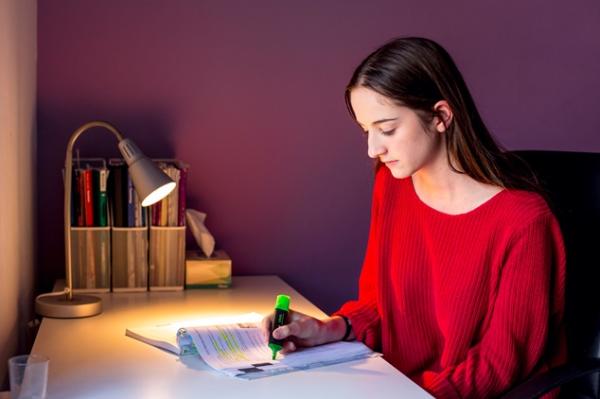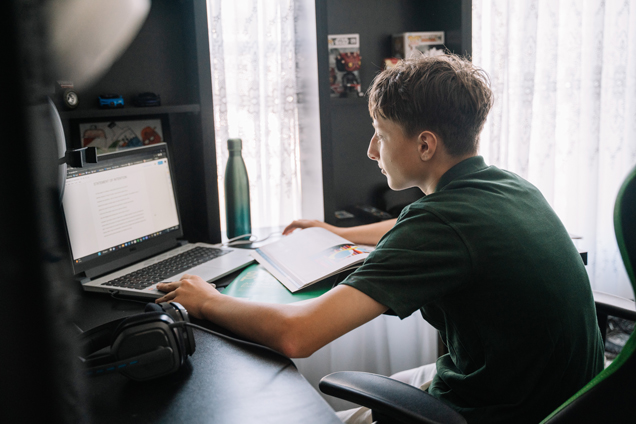Top tips for studying for exams
Take the time to plan
- Prepare a study plan for the day, keeping in mind your weekly goal/s. Make sure it realistically reflects what needs to be done, and is balanced with other important things in your life (such as work, fun, entertainment, and social activities) - that way it will be easier to stick to.
- Be flexible with your study plan by allocating extra time to catch-up on any incomplete study or tasks – sometimes things will come up unexpectedly or take longer than you thought they would. Building a study plan that works for you can take some trial and error.
- Make sure to include regular breaks in your planning, even if it’s just 5-10 minutes to stretch or grab a snack.
- Create a study space that is comfortable, well lit, organised, and fits your needs to help you focus. Make sure you have everything you need for each study session as this can help you to feel more prepared and organised.
- It could be helpful to use a timetable or an online study planner to map out what’s coming up and start to prioritise from there.
Prioritise
- When prioritising, consider all your responsibilities and determine what can be put to the side for now, or what can be rescheduled.
- Make sure you consider how long certain tasks could take, as this will help you plan and prioritise better.
- Be realistic about what days/times you can study and how long you can study for. Remember to not do too much at once as this could make things feel overwhelming.
Study with peers/friends
- Two heads (or more!) are sometimes better than one for certain tasks. Studying with peers or friends is a great opportunity to discuss, challenge each other, and perhaps more importantly, to keep each other motivated. This technique can be particularly helpful if you’re all studying the same thing and have agreed on what is to be discussed during the study session. It’s important to note that this may not work for everyone though, and some people might find working with others more distracting.
- If you’re studying online, don’t be afraid to use the online discussion forums. Be brave and post your question, because if you’re thinking it, somebody else probably is too!
Look after yourself and take breaks when you need to
Self-care doesn’t need to be fancy or complicated, it can be anything that helps your mental or physical wellbeing – and it’s especially important in helping you recharge during stressful times.
- Organise activities that you enjoy into your study plan as this will help refresh your mind after a long study session.
- When you eat things that fuel your body, it helps your mind too. Consider grabbing some healthy snacks to get you through your study period.
- Staying active can also help you to keep focused and energetic. For example, you could try going for walks, organising a gym session (possibly with friends) or stretching.
- Don't study for too long without a short break. 40-60 minutes of study then taking a 5–10-minute break is a good place to start but play around with these timeframes and see what works best for you.
Stay focused
- Have a think about what times of the day you have the most energy and plan to study then. For example, some people focus better late at night when the house is quiet, while others may have more mental energy in the morning.
- Changing your study location can help with motivation and concentration, especially if your home environment is busy which can make it difficult to concentrate. For example, try going to the library, a nearby cafe or studying outside.
- It’s okay to say "no" to social events/late night plans during the days leading up to an exam. Rescheduling these kinds of activities can help to keep you refreshed and energised for your exam and give you something to look forward to afterwards.
- When studying, consider turning your devices on silent mode, or even just putting them in a different room to avoid distractions.
- If you’re studying at home, it could be helpful to let other people who live in the house know that you’re planning to study and need some quiet time.
- Getting enough sleep can increase your energy levels, improve concentration and help you cope with stress. Learn more about sleep and your mood.
Ask for help with the exam
- If possible, take a practice exam and ask your teachers if they are able to share feedback to give you an idea of what you need to focus on.
- Some teachers are happy to be contacted during the time leading up to the exam. Find out which ones you can contact and make use of this if you need to.
- If you aren’t comfortable approaching your own teacher for advice, you could talk to one of the other teachers who teach the same subject.
- Don’t leave asking for help until the last minute. If you have any opportunities to talk to someone to at least see if you’re on the right track – take advantage of them!
Be prepared
Knowing what works best for you can take some trial and error, but once you find your groove it can make your study time more effective and enjoyable. Here are some examples of how you can prepare for an upcoming exam:
- Write things down as this can help you absorb the information and commit it to memory.
- If available, use your practice exam results to focus on what you need study.
- Look over previous exam papers to get a feel for what to expect.
- Ask your friends or peers what they are doing or what helps them with their study. They might have some ideas that you haven’t tried before.
- Consider asking your family or someone you trust to go through some flashcards with you or listen to you read out your notes. Sometimes saying things out loud and having a discussion about it can help you retain the information.
The day before the exam
- Revise your notes but avoid ‘cramming’. Remember, you’ve potentially spent a lot of time studying already, so skim through your notes and highlight key information you really need to remember.
- Familiarise yourself with where your exam is, what time it is, and what you’ll need to bring.
- Do something fun or relaxing to recharge your mind, and definitely try to get a good night’s sleep (don’t stay up until the early hours of the morning studying – as tempting as it may be!).
Day of the exam
- Keep your usual routine. For example, have what you normally eat for breakfast.
- Take some water and a healthy snack (if allowed) to the exam and dress comfortably (if you don't have to wear a school uniform).
- Go to the exam a bit early if you can and take some time to relax. If possible, do something that you know helps to bring down your stress levels, such as breathing exercises, calling someone you love, or listening to some calming music.
- Stay positive and believe in yourself and the preparation you’ve done. It might also be helpful to plan something fun to do afterwards so that you have something to look forward to and celebrate all your hard work.
What to do if exam stress is making you feel overwhelmed
Feeling overwhelmed by exam stress can get in the way of you being able to study effectively and confidently - seek support from headspace, a counsellor, or a help line such as Kids Helpline or Beyond Blue.
Get support from headspace Work and Study
If you're aged 15 - 25 the headspace Work & Study programs are tailored to your needs and can support you in developing the skills and confidence to reach your work or study goals. They’re totally free and we have options for you to participate online via webchat, video chat or phone, as well as in-person at over 50 of our headspace centres.
Find out more to help you decide which Work & Study service best suits your needs. If you’re not sure and would like to discuss your options, give us a call on 1800 810 794.
For support with your mental health and wellbeing, find your nearest headspace centre or access online and telephone support via eheadspace.
Other helpful resources
Tips for a healthy headspace - Learn how to handle tough times, get into life and connect with others.
Youth Central - Top 10 exam tips
RMIT Assignment planner - Get a step-by-step plan with tips and advice for completing your presentations and written assignments.
UNSW Sydney - Listening Note Taking Strategies
Reading Writing Hotline - Tips for anyone who may have trouble understanding or remembering material that needs to be read for study.
The headspace Content Reference Group oversee and approve clinical resources made available on this website.
Last reviewed March 2024.
Hyde, C. The University of Melbourne. (2020). 5 tips for year 12 students preparing for exams. https://pursuit.unimelb.edu.au/articles/5-tips-for-year-12-students-preparing-for-exams
NSW Government Education. (updated 2024). Prepare for tests and exams.
Open Universities Australia. (2021). How to study effectively for your exams. https://www.open.edu.au/advice/insights/how-to-study-effectively-for-your-exams
Reach Out. (n.d) Coping strategies for exam stress. https://au.reachout.com/articles/coping-strategies-for-exam-stress
The University of Queensland Australia. (n.d). Exam tips. https://my.uq.edu.au/information-and-services/student-support/study-skills-and-learning-advice/study-skills-and-learning-advice-overview/exam-tips
Queensland Government. (updated 2023). Exam stress. https://www.qld.gov.au/youth/looking-after-your-mental-health/managing-your-thoughts/exam-stress
Get professional support
If you feel you need help there are a range of ways we can support you.


